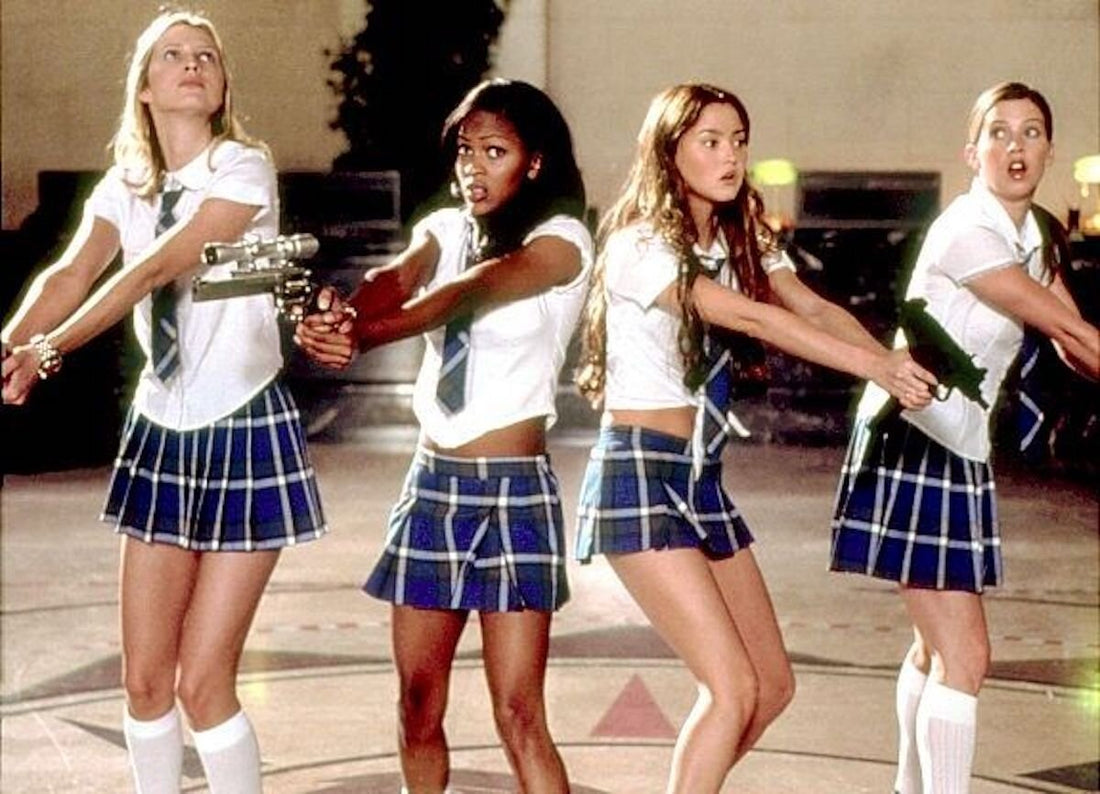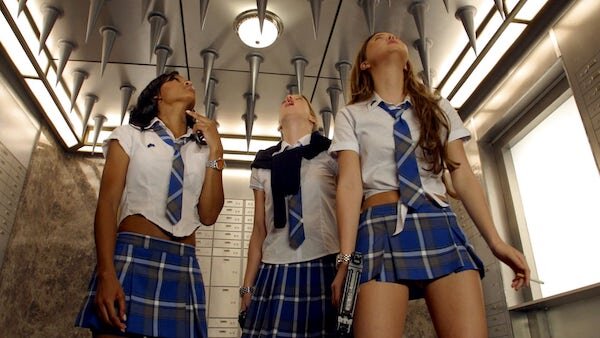The last few years have given us more truthful, empathetic lesbian love stories than ever – but as the tone, in parts, has been somewhat dour, there has never been a better time to look back to Angela Robinson’s D.E.B.S, a film which understands joy and camp as crucial elements in lesbian love stories. Jo Reid unpicks the subversion of a genre.
“Everyone thinks you’re a hero but you’re really a slut. A gay slut”
Susan Sontag notes in her essay Notes on Camp that the essence of camp “is its love of the unnatural: of artifice and exaggeration”. Camp finds pleasure in failed seriousness, and celebrates the theatricality of experience. As a concept it is elusive and hard to purposefully capture -– the 2019 MET gala was filled with celebrities trying and failing desperately to be camp. To Sontag, its point is to “dethrone the serious” and, above all, is “a mode of appreciation – not judgement. Camp is generous. It wants to enjoy.”
Depictions of lesbians in contemporary cinema tend to shy away from camp. The 2010s have seen an increase of prestigious dramas starring queer women, from Carol (2015) to Portrait of a Lady on Fire (2019), and more recently Ammonite (2020), many of which have recieved critical and commercial success. However, plenty of jokes have been made about the type of films starring women in love: prestigious period dramas of longing looks and yearning set upon a backdrop of inevitable tragedy and forbidden love. Lesbian films nominated for awards are melancholy romances, where snatches of joy are fleeting, and endings bittersweet. Must all depictions of lesbian relationships be like this?
Reflecting on a panel discussion at queer conference Persistent Vision in 2006, lesbian writer/director Angela Robinson expressed frustration at the need for lesbian audiences to have their own film that could cross over from indie film circuits to become a mainstream hit; their “Dykeback Mountain”. She stated: “We don’t have to beg for scraps and try to cross over […] just make great, fun, moving, hilarious, intense, bold work.” Queer cinema was not going to be liberated by chasing dreams of prestige drama to appeal to straight audiences. Robinson knew this better than anyone: “I made a lezzie movie a couple of years ago called D.E.B.S. – a project close to my heart. It was supposed to ‘cross over’. Teenage girls, short skirts, light-hearted comedy, what could go wrong?”
Released in 2004 to mixed to negative reviews, D.E.B.S was a commercial and critical failure. It was decried by critics as frivolous fluff, with several male critics complaining that not even sexy lesbian spies in miniskirts could hold their attention for 90 minutes. New York Times critic Stephen Holden called it “heat-free” while Rolling Stone’s Peter Travers stated that “Angela Robinson’s dim-witted satire is libido-killing.” On the other hand, Carina Chocano, writing for the LA Times, found that it “is not exactly the freshest sock in the hamper, but as a teen romance with a Sapphic twist it’s unself-consciously sweet and genuine”.
Following a group of college-aged super spies, D.E.B.S is a parodic lesbian romcom about a romance between good girl spy-in-training Amy Bradshaw (Sara Foster) and her supervillain nemesis Lucy Diamond (Jordana Brewster). Appearing at a glance hyper-sexual, with its four main spies in tight blouses, schoolgirl miniskirts and high heels, the girls themselves are never sexualised in the way their costumes might suggest. There are no lingering shots of their bodies, or teasing upskirt perspectives. While the visual signifiers of sexualisation are apparent in the costume design, the film is made camp through its over-exaggerated and absurd aesthetic.
D.E.B.S parodies sexy comedies of the early ’00s such as Charlie’s Angels, and the outfits themselves are reminiscent of Britney Spears’ emblematic look in the music video for Hit Me Baby…One More Time. The ridiculous nature of the costuming is further exposed when the protagonists go to school and reveal they are the only ones in the hyper-sexualised outfits – the other students wear a far more conservative version of the uniform. Throughout D.E.B.S, camp is utilised to disarm the power of a costume typically used to objectify women. It purposely removes the male gaze and substitutes it with a uniquely queer, and specifically lesbian, one.
The relationship between Lucy and Amy, while not played for laughs, is surrounded by and filtered through the aesthetics of excess. They first meet when Amy and her team spy on a date between Lucy and a russian assassin, misinterpreting it to be villainous networking. Through grenade and gunfire, Amy and Lucy meet, their body language immediately showing mutual attraction. Romantic cliches – eyes meet across a room, “it's not you, it's me” banter – are framed against a violent shoot-out. As the relationship develops, the situations remain humorous but the couple’s emotions are sincere. While making out, Amy accidentally snaps Lucy’s bra. It’s a small moment, but indicative of how D.E.B.S takes time to enjoy queer relationships, including all the awkward fumbles. The performative, tongue-in-cheek expressions of desire are sincere, but refuse to take itself too seriously. Most of all, it is fun.
As Mikaella Clements notes in her exploration of dyke camp, “The performed queer desire is no less real for being made a joke; the performance is part of the desire”. D.E.B.S utilises the camp performance of lesbian desire as a way to express a queer love that is recognised by a queer audience, without pandering to heterosexual audiences. Representations of lesbians in the early ’00s were dominated by straight women performing for the benefit of men (Madonna kissing Britney Spears and Christina Aguilera at the 2003 MTV Video Music Awards, for example). However, Clements notes: “Dyke camp is explicitly dominated by women who know just how to touch and want other women [… it] takes private lesbian contact and makes it public.” D.E.B.S showcases moments of queer domesticisty and affection: not only do the characters kiss, but they discuss their feelings, hopes and dreams. The bedroom is not just a place for physical intimacy, but emotional intimacy too. Throughout D.E.B.S there is a push and pull between the absurdity of the world of espionage and the tender lesbian romance between Amy and Lucy. At one point, Amy’s friend Janet (Jill Ritchie) tells her, “Everyone thinks you’re a hero but you’re really a slut. A gay slut.” Either Amy can choose to be respected in the ridiculous world of super spies, or she can be true to herself and be happy. She chooses to be a gay slut.
Sontag describes camp as finding “the success in certain passionate failures.” In many ways, D.E.B.S could be seen as a failure. It failed commercially, it failed to cross over, and it fails to be considered part of the unofficial pantheon of Important Lesbian Films. It is not even as remembered as fondly as its campy lesbian romcom sister But I’m a Cheerleader. It does not tackle any important issues affecting the queer community, nor is it artistically daring. It’s shallow: a bright, tacky love story between a super spy and a super villain with lines like “This is espionage, not the girl scouts!” And it is radical. Robinson was bold enough to imagine a story where queer joy is prioritised, and lesbian narratives are not shaped by suffering. D.E.B.S is a film in which the lesbians drive off into the sunset, living happily ever after.
Sontag states that successful camp “even when it reveals self-parody, reeks of self-love”. While refusing to take itself seriously, D.E.B.S does not mock queer love. The world D.E.B.S creates is ridiculous, but this camp artificiality is built around a sincere central relationship. In D.E.B.S, the heart of the queer experience is not pain, it’s not unfulfilled romance defined by yearning. It’s pulling a gun on your nemesis-turned-lover as she smiles and says: “We’ve got to stop meeting like this”.
Jo Reid is a Scottish writer working in Glasgow. Recently graduated with a Masters in Film, Exhibition and Curation, she is passionate about everything tacky, playful and cheesy, with a particular focus on children’s engagement with media. Find her on twitter @_jomreid


